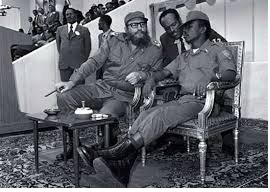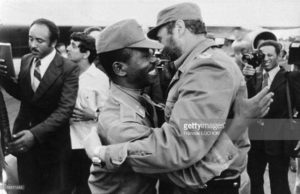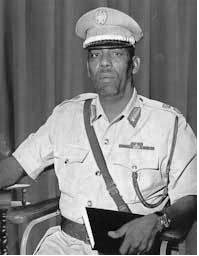By Faisal Roble
On December 3rd, 2016, the charismatic and erstwhile revolutionary leader of Cuba was cremated and his ashes were buried. Gleaning from Social media, there are three viewpoints held by Somalia’s elite on Castro’s death.
One group had unapologetically grieved over the death of the man this group simply and endearingly called Fidel; socialist and almost extinct, this group is keen to highlight Fidel’s contribution to 1970s liberation movements in Africa, Angola in particular. Socialists like to highlight how Fidel embarrassed the “imperialist power” to the north. Add this to Fidel’s “commitment” to bettering the lives of Cuba’s impoverished peasantry guided by his unfettered commitment to socialism.

With no visible or expressed shame, this group is oblivious to Castro’s subservient role in executing Russia’s dirty wars in distant lands. One such case is Cuba’s role in the Ethio-Somali conflict of 1977.
Comprising the majority of Somalia’s elite, group two rejoiced at Castro’s death in the same vain the right-wingers and ultra-nationalists in the United States did. Surprisingly enough, this group’s feelings have echoed the words of President-elect Donald Trump and Senator Ted Cruz of Texas, the latter being an ultra-right evangelist politician of Cuban descent. Not only did Somalis who rejoiced at Castro’s death denounce him because of his socialist ideals, but they never forgave him for what he did to Somalia in that infamous war of 1977. This group likens Castro to the “devil” for he championed the destruction of their country; they unanimously wish him to “burn in hell.”
The military support Cuba gave to Ethiopia’s dictator, Mengistu Haile Mariam, against Somalia had colored group two’s view of Castro. In 1977, Cuba, under the tutelage of Russia, flew over 11,000 of its largely black soldiers; Russia also ferried a huge hardware of weapons plus East German advisors and Yemeni troops to combat Somalia. Towns like Jigjiga, one of the most key conflict theaters, wasflooded with Cuban soldiers, or “Kuubo Naaso dheer,” a derogatory nickname for Cuban soldiers in the region to imply that they were vampires.
Group three, a more rationale and middle road, would like to not dismiss the worldwide contributions by the Cuban revolution and by Castro’s leadership in debunking the hegemonic ideology of the West. In addition, Castro’s contribution to African liberation movements is uncontested. As a matter of fact, Cuba and Somalia both in their own rights contributed to the liberation movements of Angola, Mozambique, and Namibia. Unique to Somalia is that it helped reconcile or end and eventually help stabilize the tragic Ugandan in mid-1970s.
Castro’s Renegade Position on the Horn’s Conflict
There is serious contestation against Fidel’s revolutionary credentials, especially when evaluating his actions throughout 1970s and beyond. Castro lost his true socialist spirits in 1970s; instead, he morphed into a Russian client and transformed the Cuban polity into a dictatorship to which passed on to his younger brother. The Castro of 1970s is quite different from the one who midwifed Cuba’s revolution in 1959. By 1970s, an era when Russia morphed into what some leftists called a “social imperialist” power, Castro was busy undertaking several interventions as part of his subservient role to his benefactor–Russia.
How else could a true revolutionary leader like Castro misread the history of the Horn of Africa and come out against oppressed Somalis?
If his memory betrayed him, the Somali question in Ethiopia is one of the oldest national questions in modern history—indeed a question that arose from the same era as that of the Balkan’s in Southeastern Europe. In the Horn of Africa in 1920s, Sayyid Mohamed Abdulle Hassan was waging war of liberation against multiple colonizers. In the Balkan region, old empires were being restructured. In Russia, Lenin just released his book on “Critical Remarks on the National Question) in the spring of 1913.

Somali question even goes beyond this timeline. Don Oberdorfer’s article, which the Washington Post carried in 1978, underscores how fundamental and complex, if not undyingly old, the question is. He wrote:
And at ground level in the harsh volcanic desert and eroding plateaus of one of the world’s most poverty-stricken regions, the conflict is the continuation of 500 years of intermittent fighting between homogeneous Moslem people called Somalis and the diverse Christian tribes that make up the venerable empire of Ethiopia” (March 5, 1978).
Moreover, according to the late Samuel Huntington, the perennial conflict between Somalis and Christian highlanders, particularly Amhara feudalists, should not be taken lightly. It is one of the most formative and oldest sources in the prevailing “Clashes of Civilization” between Muslims and Christians. To the chagrin of many even hardcore conservatives, Huntington argued that the war in the 16th century between Ahmed Al-Khazali (Ahmed Gurey) and King Libna Dhingil of the Amhara aristocracy is part of the now-resurgent conflict over “civilization.” In short, the conflict in the Horn is proxy of the conflict between the East and the West.
Why Castro did not give this question its due weight, we may never know, we can, however, surmise that Castro and his Russian benefactors subordinated the question of “nations and nationalities” principles pertaining to Somalis, a key principle in Marxist dogma, to Russia’s social imperialistic needs. There is no other plausible explanation but an abandonment of principles for functional realpolitik.
If Castro was still a true Marxist that he once was, he would have opted to solving the Somali question during Mengitu’s regime in the same way Lenin did with the polish question–implementing the rights of nations and nationalities including and up to secession. Alas, that was not what Russia and Cuba under Castro did. Instead, they showed, according to a US diplomate, undivided resolve to go to a full scale war against Somalis.
By the time Castro was intervening in the Horn of Africa, the original Soviet Union and its progressive ideology that Lenin had created morphed into “social imperialism;” the ideals of Communist International was dead and buried. It was against this new social imperialist tendencies and the speed with which it expanded into the continent that perplexed the West.
Was Barre Right to go to War?
Contesting over the death of Castro among Somalia’s elite masks a contested history over Barre’s era. Some argue that, because of their opposition to Barre, that Castro was right to punish Barre; others say that Barre failed Somalia because he did not read the geopolitics of the time. Barre’s misjudgment to go to war against Mengistu in defiance of the Eastern bloc (Russian and Cuba without securing the full backing of the West) was a tactical blunder, they argue.
Others still show faith in Barre in that he knew well how the world order was organized. But the opportune time plus his believe in the theory of the right of the oppressed Somali nationals coupled by the need to free them from Mengistu Haile Mariam was not to be ignored.

By 1977, Ethiopia was under a brutal dictator; the Red Terror, which killed thousands of High School and University students, compelled urban youth to vacate the cities and join TPLF, EPLF, EPRP, OLF, and WSLF. All these movements were waging guerrilla warfare against Mengistu. Melez, Salah Sabi, Berhane Masqal of EPRP, and Yusuf Dheere of WSLF were all working together to get rid of the Derge fascist which was supported by the Russian military complex. Despite any support, with multiple insurgencies and growing opposition to fascist policies,” as told by a US policymaker to the Washington Post in 1978, there was a sense Mengistu’s regime was “coming apart.”
At this point in history, Somalia at its zenith in military power and internal cohesion coupled by enviable mass mobilization both in the urban and rural sectors, Barre was presented with several historical opportunities: (1) He was supported by revolutionary forces inside Ethiopia that were fighting for their rights; (2) The entire Arab League and the Islamic world also backed him; and (3) Many Europeans, knowing the history of the region, did not raise any serious objection to Barre’s goal in the war to liberate the Somali region. It was a momentous period for Somalis to get rid of a 500-year old neftiegna (gun touting expeditionary) and Abyssinian conquest.
In writing this chapter of Somali history, one can legitimately exonerate Barre, but clearly blame Castro who betrayed a cause of people’s right to equality – the right of nations and nationalities to determine their fate. Although Barre in the end lost the war, the late Melez Zenawi at least sought to implement that spirit (the rights of Somalis) through “Article 39” of the current Ethiopian constitution.
As Cubans bid farewell to Castro, Somalis in Ethiopia are surely but steadily returning from asylum and rebuilding their country; there is an entirely new generation that has been raised under “Article 39.” If Castro is remembered as a hero by millions in Angola, he is perceived a villain in the eyes of millions of Somalis who ended up in refugee camps for decades because of his military intervention in the 1977 conflict in the Horn.
Faisal Roble
Email: [email protected]
—
Faisal Roble, a writer, political analyst and a former Editor-in-Chief of WardheerNews, is mainly interested in the Horn of Africa region. He is currently the Principal Planner for the City of Los Angeles in charge of Master Planning, Economic Development and Project Implementation Division.
We welcome the submission of all articles for possible publication on WardheerNews.com. WardheerNews will only consider articles sent exclusively. Please email your article today . Opinions expressed in this article are those of the author and do not necessarily reflect the views of WardheerNews.
WardheerNew’s tolerance platform is engaging with diversity of opinion, political ideology and self-expression. Tolerance is a necessary ingredient for creativity and civility.Tolerance fuels tenacity and audacity.
WardheerNews waxay tixgelin gaara siinaysaa maqaaladaha sida gaarka ah loogu soo diro ee aan lagu daabicin goobo kale. Maqaalkani wuxuu ka turjumayaa aragtida Qoraaga loomana fasiran karo tan WardheerNews.
Copyright © 2024 WardheerNews, All rights reserved


